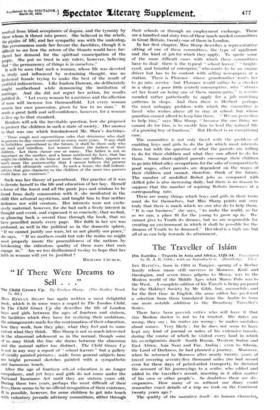" If There Were Dreams to Sell . . ."
Miss EVELYN SHARP has again written a most delightful hook, which is in some ways a sequel to The London Child. In The Child Grows Up she describes the life of London boys and girls between the ages of fourteen and sixteen, the facilities which they have for realizing their ambitions, the arrangements made for the continuation of their education, how they work, how they play, what they feel and to some extent what they think. Miss Sharp is not so much interested in the abnormal adolescent as in the normal, though some of us may think the line she draws between the abnormal and the normal rather too distinct. The Child Grows Up is not in any way a report of school leavers " but a gallery of vividly painted pictures ; aside from general subjects here are bright personal sketches painted with a sympathetic and humorous touch.
After the age of fourteen school education is no _longer compulsory, and yet boys and girls do not come under the National Insurance Act until they are sixteen years old. During these two years, perhaps the most difficult of their lives, there seems to be no official recognition of their existence. It is possible, however, for some children to get into touch with voluntary juvenile advisory committees, either through
their schools or through an employment exchange. There are a hundred and sixty-two of these much-needed committees in Great Britain, twenty-one of them in London.
In her first chapter; Miss Sharp describes a representative sitting of one of these committees, the type of applicant and- the kind of job for which they apply. To quote sonic of the more difficult cases with which these committees have to deal—there is the typical " school leaver," " bright- eyed, and brimful of enterprise," who wants to he an engine driver but has to be content with selling newspapers at a station. There is Florence---whose grandmother want: her to go into service—but Florence would rather be a c'hec'ker in a shop ; a poor little (cured) consumptive, who " always set her heart on being one of them mannequins," is recom- mended rather pathetically to apply for a job matching patterns in shops. And then there is Herbert perhaps the most unhappy problem with which the committee is faced—who wishes above all to stay at sehotil. but whose guardian cannot afford to keep him there. " We are powerless to help him," says Miss Sharp, •• because the one thing we cannot do for him, is to enable him to lead the natural life of a growing boy of fourteen." But I lerbert is an exceptional case.
The committee is not only faced with the on ihlent • of enabling_bays and girls to dr; the job which most interests them but with the question of what the parents ale willing to do for their. children and what they can afford to do for them. Some short-sighted parents encourage their children to go into blind-alley occupations for the sake of comparatively good wages, other parents arc dependent on the wages of their children and cannot, therefore, think of the future. The number of unskilled Robot jobs as compared with skilled jobs is also increasing daily, but there is no reason to suppose that the number of aspiring Robots increases at a corresponding rate.
There are many things which boys and girls in their teens must do for themselves, but- Miss -Sharp points out very truly that there is much which we can also do to help them. " It is our business," she says, " to make the world, so far as we can, a place fit for the young to grow Ian in. AVe cannot give to Youth its dreams, but we are responsible for creating an environment in which it shall be possible for the dreams of Youth to be dreamed." Her ideal is a high one but all of us can help towards its attainment.
















































 Previous page
Previous page